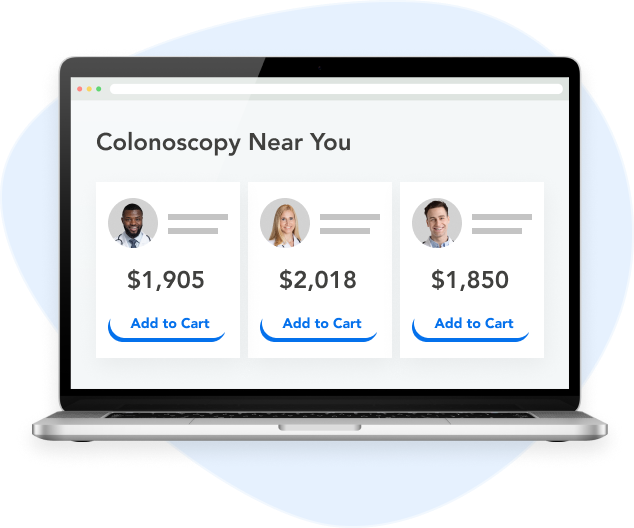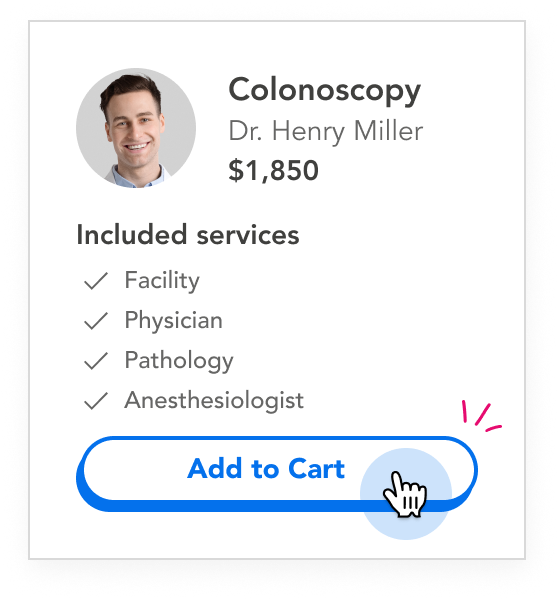Colonoscopy near Valparaiso, IN
Save by purchasing this procedure online.
National Average 4,975
Regional Average2,650Save $2,325
Financing Options
Promotional financing available when you pay with CareCredit. $200 minimum purchase. What is CareCredit?
MDsave and Your Insurance
Contact your insurance company directly to see if your purchase can count towards your deductible. Details
Sohn, Kevin, MD
Internal Medicine
4.3
1700 W Central Rd, Suite 140
Arlington Heights, IL 60005
Offered by
Gerard, David, MD
Gastroenterology
3.7
Gastroenterology Services, Ltd
3825 Highland Ave., Tower 2, Suite 203
Downers Grove, IL 60515
Offered by

Albert, Dr. Andrew
Gastroenterology
4.0
2835 North Sheffield Avenue Suite 303
Chicago, IL 60657
Offered by

Dyer, Dr. Julia A.
Gastroenterology
4.0
850 W. Irving Park Road
Chicago, IL 60613
Offered by

Igolnikov, Dr. Alexander
Gastroenterology
4.8
1331 State Street, Suite 340
La Porte, IN 46350
Offered by

Offered by

Graham, Dr. Corey
General Surgery
4.0
1000 Provident Drive, Suite C
Warsaw, IN 46580
Offered by

Harig, Dr. James
Gastroenterology
4.7
1205 Provident Dr. Suite A
Warsaw, IN 46580
Offered by

Offered by

Otoo, Mary, MD
General Surgery
4.9
1000 Provident Drive, Suite C
Warsaw, IN 46580
Offered by

Money Back Guarantee
We will refund your payment in full if you end up not needing your purchased procedure and do not receive care. Details
Get Care In Three Easy Steps
Compare Upfront Prices

Search by procedure and location to browse local providers and compare upfront pricing.
Buy Your Procedure

Pay for your procedure online or by calling (844) 256-7696. Or buy your procedure at the facility before your appointment is scheduled.
Receive Your Care

Follow the scheduling instructions given by your provider. Bring your voucher to your appointment.
Frequently Asked Questions
View All FAQsProcedure Details
What is a Colonoscopy?
Colonoscopy is the preferred diagnostic tool for colon cancer screening. The American Cancer Society recommends colorectal cancer testing for everyone starting at age 45, though some people with certain risk factors may need to start at a younger age. You should be screened at an earlier age if you have a family history of colon cancer or polyps.
A colonoscopy is a medical procedure that physicians use to detect abnormalities or changes within the colon, or large intestine, and rectum. Because the physician is able to remove polyps during the test, a colonoscopy is one of the only procedures that diagnoses and treats the disease at the same time. During this procedure, the physician inserts a colonoscope, a long and flexible tube, into the rectum. The tube features a video camera on its end, which allows the doctor to view the entire inside of the colon as the tube moves. If any abnormal tissues or polyps are found along the way, the physician can use a scope to remove them as well as to take biopsies or tissue samples in the process.
One of the main patient concerns when scheduling a colonoscopy is whether deep sedation or conscious sedation will be used. Deep sedation with an anesthesiologist present is one of the safest ways of performing a colonoscopy. Propofol is the most common anesthetic used to achieve deep sedation. This drug must be administered and monitored by an anesthesiologist or CRNA. The anesthesiologist can focus on patient comfort and safety while monitoring the patient’s response to the cardiovascular, respiratory and neurologic changes that occur during the use of intravenous (IV) propofol. Deep sedation with propofol can positively influence both the patient’s experience and the finding of polyps. In conscious sedation, the patient is given a drug to numb and relax them, but they remain awake throughout the procedure. The patient will be able to respond to verbal commands, will wake fairly quickly, and generally will not remember the procedure afterwards.
Why is it Used?
Although other diagnostic exams exist for looking at the colon, such as MRI and CT scans, there are a number of reasons why a colonoscopy is preferable. The primary reason is because it is a minimally invasive procedure that allows for a thorough view of the entire rectum and colon. Another benefit of the colonoscopy is that many issues can be dealt with or removed at the same time. Some of these issues include biopsying tissue or removing polyps or other abnormal tissues. Some small colon cancers are also removable by colonoscopy, which eliminates the need for more invasive procedures.
What Conditions Does it Treat?
Physicians recommend colonoscopy to screen for colon or colorectal cancer, as well as to investigate other signs and symptoms in the intestinal tract. Colonoscopy can help physicians explore potential causes behind abdominal pain, chronic constipation, rectal bleeding, diarrhea and many additional intestinal problems. Physicians recommend a colonoscopy every 10 years as a vital screening for colon and rectal cancer.
Patient Reviews
4.9
What did you like most about using MDsave?
The ease of getting the voucher.
What could we do to improve?
Nothing. The experience was great for me.
What did you like most about using MDsave?
It is accepted
What could we do to improve?
Why perfect
What did you like most about using MDsave?
Since the hospital was the middle man, I didn't have to do anything.
What could we do to improve?
you're good
What did you like most about using MDsave?
Easy
What could we do to improve?
Add already have an appointment for a procedure
What did you like most about using MDsave?
No cost to me
What could we do to improve?
Absolutely nothing
Procedures
© Copyright 2025 MDsave Incorporated.
All Rights Reserved.



